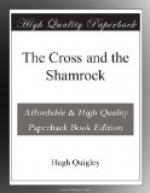“Fellow!” said his wife, looking at her husband, in anger. “Is that a proper term to apply to the child?”
“It is not an improper or inappropriate one, not more so than calling him ‘child,’” said he. “I was just going to remark the coolness of his reply when you introduced my name as the parish clergyman. ’A Catholic clergyman, I hope, sir,’ said he; ‘as such, I am very glad to see you.’ Did you observe how sad and demure he looked when told he was to be sent to school, where he could read the Bible, and become acquainted with the word of God?’ O sir,’ said he, ’much obliged to you; I have got a Bible already, and other good books of devotion, which we brought from home. I should be very glad to learn what is good,’ said he; ’but I trust I have got my catechism well committed to memory; and having made my first communion and been confirmed, I was discharged from class, and appointed a Sunday school teacher, by our good priest, Father Doyle.’ And on my telling him that he could be a teacher here of a better religion than that of his country, he shook his head, declining the honor of the post offered, and remarking that ’it was impossible to have a better religion than that which had God for its author—the Catholic religion.’ With this bit he retired (ye all saw him, I need not repeat more) from our presence, a blush of mental triumph playing on his smooth cheek.”
“Sartain there was such a feelin’,” said an old gray-headed Yankee, who sat at the head of the table, and who was guardian of the establishment. “You can’t do nothin’ with these Papists,” continued he. “I have seed the attempts made time and agin, but allers fail. The very children, only five years of age, of that ere religion, refuse to eat flesh on Friday, or to disobey such other darned ceremonies of their church as they are brought up to.”
“Wal, Mr. Burly, madam, and my esteemed brother Valentine, my plan is this,” said Van Stingey: “send them, separate or in couples, here and there, into the country, and there, with the farmers, they will soon get used to our church ways, and be gradually broke in.”
“That you can’t do safe, neither, Van,” said the boss of the house, “for they would raise such a dust as would bring half the city around us; and you know the people would never consent to any thing like cruelty towards one so young and interesting as these here are.”
“You say the truth there, sir,” said the parson.
“It would be cruel to separate the dear ones,” said the wife; “wherever they are sent, let them go together. I could pledge my watch and wedding diamond ring to help to raise such beauties,” said she, passionately. “Surely they cannot be Irish, or they must belong to some race different from the Celtic half savages which we have read inhabit Ireland.”




